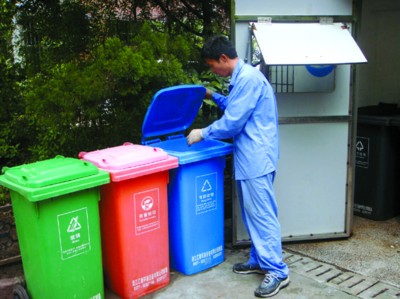Time to bin Beijing's litterbugs
- By Ember Swift
 0 Comment(s)
0 Comment(s) Print
Print E-mail China.org.cn, July 7, 2013
E-mail China.org.cn, July 7, 2013
Beijing is a city of street cleaners who patrol the roadways from dusk until dawn in search of litter to whisk away. These lone workers, many of whom are seniors, are a common sight, dressed in obligatory fluorescent orange, carrying brooms and large, bag-shaped dustbins.
|
|
|
Beijing is a city of street cleaners who patrol the roadways from dusk until dawn in search of litter to whisk away. [File photo] |
This creates a great image to outsiders of a city that prides itself on being civilized and clean and offers extended employment to senior citizens. It would, however, be far more impressive if Beijing were to engage in anti-littering education.
Back in Canada in the 1980s, children learned in school to scold their parents when recently torn off wrappers were hastily dropped on the sidewalk between the shop and the parked car. The word "litterbug" was popularized and it was not uncommon to hear this phrase in local media: "Don't be a litterbug! Keep Your Community Clean!" As younger generations often teach the older generations, parents learned to appease their children and thus, new habits were formed. After all, who can argue that picking up after oneself is not a good moral and behavioral standard to model for one's progeny?
Anti-littering has clearly not penetrated the education framework here in China. Every day, you can see people throw napkins, empty plastic bottles, or other random rubbish, from their car windows at stoplights. Litter is tossed from all types of vehicles, from shiny Audi A6s to the narrow white minivans of laborers. It's so common, in fact, that no one seems at all bothered by this behavior. It's considered socially acceptable.
But it's not just drivers. Try hanging around a neighborhood cigarette kiosk for a short period of time to observe the customers coming and going. Westerners will be dismayed to note the considerable number of smokers who immediately tear off the pack's cellophane, release it from their grip and, allow it to float down to the sidewalk. Can a person need a cigarette so badly that depositing the cellophane in a public wastebasket is too time-consuming?
A common Chinese attitude in response to these observations is that littering keeps people employed. "Otherwise, the street cleaners wouldn't have a job," said one friend in response to my frustration.
This rationale is so terribly flawed. There are many ways to employ a nation of people; but refusing to alter uncivilized and, frankly, environmentally irresponsible behavior is like suggesting that a nation should encourage its people to commit crimes so that police officers have a job to do. No one would dispute the absurdity of this notion.
That's why anti-littering education must be prioritized in China - and soon. Eventually, it should lead to a collective respect for the shared urban environment which is so engrained in this society's consciousness that people wouldn't dare lose face by dropping their litter publicly, for fear of chastisement or worse, legal reprimand.
As proven by Canada's history, anti-littering campaigns eventually do lead to the implementation of by-laws or fines for dirtying the urban landscape. Nowadays, putting litter in appropriate trash cans is just part of the "Canadian way."
Anti-littering campaigns lead to collective recycling campaigns. The city of Toronto, for instance, offers urban trash cans with three separate slots: Recyclable paper items, recyclable cans and bottles, and non-recyclable items (litter only). Enough social awareness has been instilled in Torontonians that these garbage bins are, for the most part, used effectively and accurately.
We all know that Beijing's urban trash cans, despite being installed just before the Olympics with the globally impressive double slots - one for recyclable trash and one for non-recyclable trash - are simply not used discriminately. The closest thing to recycling that we have here in Beijing is accomplished through the sweat and labor of enterprising individuals who personally elect to sort through our trash, haul recyclables on their backs or bikes to depots, and collect minimal recompense for their efforts.
My Chinese friend would say: "Yes, but they live off this income."
If the Chinese government were to begin a large-scale recycling program which was managed by city workers, these same people sorting through the trash on their own would have the opportunity to be officially employed in that field. And think of the extra income the government could amass from such an efficient transfer of waste into re-saleable materials, which could be funneled back into the manufacturing marketplace - especially the growing green industry! In fact, would it be crazy to suggest that such additional public income should go towards a much more supportive welfare system here in China? Perhaps if the unemployed or elderly could rely on their country to offer them some monthly sustenance, they wouldn't have to sort through the trash for plastic bottles to sell or don an orange outfit to earn a pittance sweeping up the litter which has been so carelessly tossed from the windows of passing Audis.
The author is a Canadian musician and writer who lives in Beijing with her husband, a prominent Chinese musician. For more information about Ember Swift and her life and work, please visit: www.emberswift.com
Opinion articles reflect the views of their authors, not necessarily those of China.org.cn.






